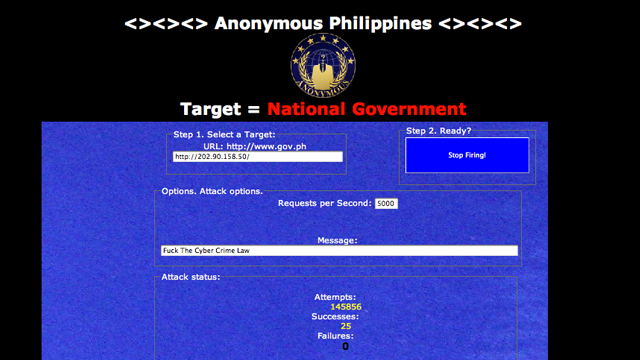SUMMARY
This is AI generated summarization, which may have errors. For context, always refer to the full article.

MANILA, Philippines – Hackers announced they were going to attack various government websites early Wednesday, October 3, as the Philippines’ controversial Cybercrime Prevention Act of 2012 took effect.
— Anonymous Press (@AnonymousPress) October 2, 2012
Anonymous Op Philippines | Target: gov.ph – 202.90.158.50 | FIRE | Web Hive – bit.ly/Swu43h | #Anonymous #OpPhilippines
— PLF (@PLF2012) October 2, 2012
Anonymous Operation Philippines | Target: DOWN | gov.ph | #Anonymous #OpPhilippines #FuckTheCyberCrimeLaw #Freedom
— Anonymous (@YourAnonNews) October 2, 2012
The Philippine government’s website, www.gov.ph, was down as of 1:30 am, although efforts were made to revive it shortly after. Anonymous, a global group of hacktivists, announced it was behind the attack that planned to shut down the following Philippine government websites:
In a YouTube post, Anonymous said the law “poses serious threats to Internet freedom, the right to privacy and other essential civil liberties including the freedom of speech, expression, and the press.”
It added: “As you can see, the worst thing you can do about the country is being blind to its own diseases. Are you trying to console yourself in thinking that we [have] a good government with no flaws? No.”
Netizens and journalists also protested online by changing their profiles on Facebook, Twitter, Tumblr and various social media platforms. There have been quite a number of gimmicks on Facebook alone — from setting profile pictures into simple black images, creating new Facebook covers in protest of the Cybercrime law, to comments blacked out and labelled with “Comment Blocked. R.A. 10175.”
Rappler also took a stand against the law by changing its Facebook, Twitter and Instagram profiles.
President Benigno Aquino III signed the law on September 12. Its questionable provisions that punish online libel and grant government power to shut down websites on prima facie evidence, among others, prompted lawyers, bloggers, journalists, and members of the academe to ask the Supreme Court to nullify it.
The SC met en banc on Tuesday, October 2, but decided against issuing a temporary restraining order that could have stopped the law’s effectivity today. The Court will tackle again the petitions — 7 filed so far as of Tuesday, October 2 — when they meet in full court session next Tuesday, October 9.
Various groups staged a black protest on Tuesday at the SC, led by the College Editors Guild of the Philippines (CEGP), Kabataan partylist group, and the Philippine Internet Freedom Watch Alliance (PIFA).
The law’s contentious provisions count online libel as a cybercrime (Sec 4(c) 4), increase penalties for crimes in the Revised Penal Code (Sec 6), and authorize the Department of Justice to shut down sites believed to contain harmful content based on prima facie (at first sight) evidence (Sec 19). – Rappler.com
| . | More on the Cybercrime Law: |
Add a comment
How does this make you feel?
There are no comments yet. Add your comment to start the conversation.